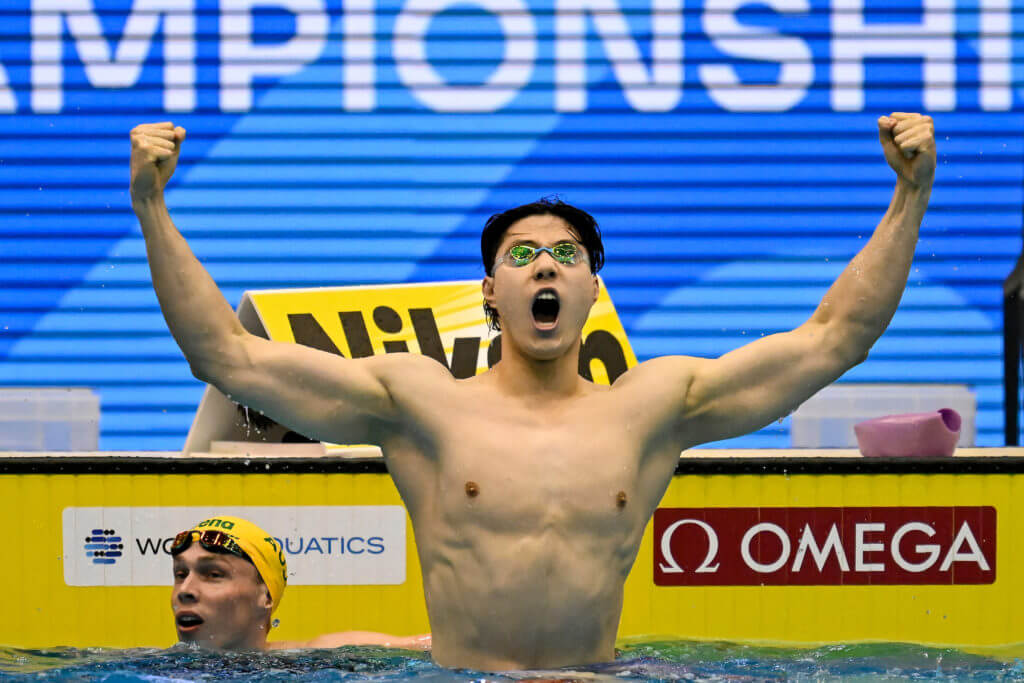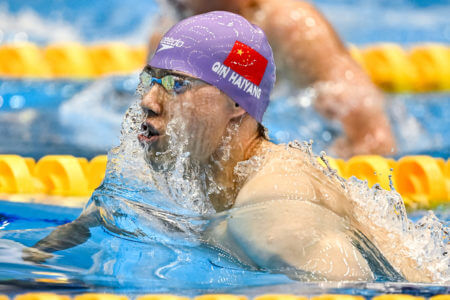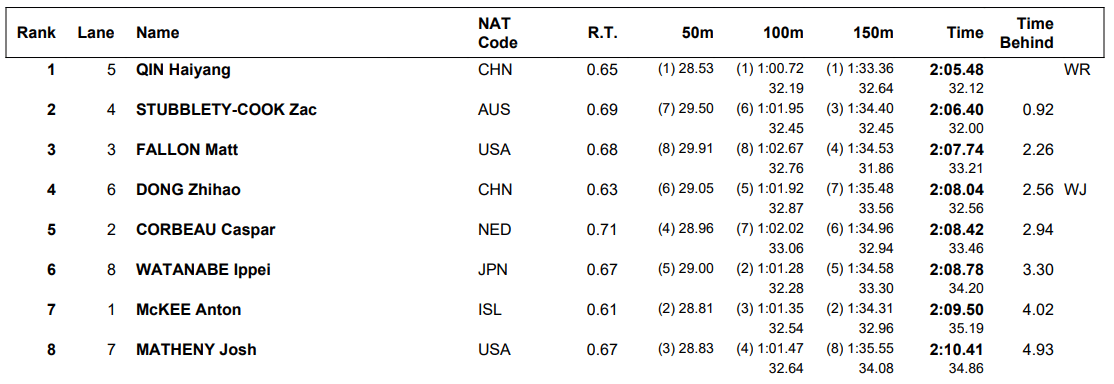World Championships, Day Six Finals: Qin Haiyang Completes Breaststroke Sweep With World Record

Editorial content for the 2023 World Aquatics Championships is sponsored by FINIS, a longtime partner of Swimming World and leading innovator of suits, goggles and equipment.

World Championships, Day Six Finals: Qin Haiyang Completes Breaststroke Sweep With World Record
There is no doubt as to the identity of the world’s premier male breaststroker. Qin Haiyang had never won a medal at a major international long course medal prior to this week. Now, Qin has completed the first 50-100-200 sweep in one stroke in World Championships history. The 24-year-old from China beat a trio of consistent veterans by more than one second in the 100 breast, and he won the 50 breast by a convincing three tenths. But perhaps his win in the 200 breast was the most resounding of all as he dethroned a man who was the defending world and Olympic champion and world-record holder.
Over the past two years, Zac Stubblety-Cook had been the man in the 200 breast. He was the only swimmer to arrive in Fukuoka holding both titles as well as the world record, but Qin’s upset bid took shape as he ticked off his gold medals throughout the week in his first two individual races plus the mixed 400 medley relay, where he took control on the second leg and built a lead that his Chinese female teammates would not surrender.
A gold medal in the 200 breast would require Qin to jump out ahead of the field and hold on as Stubblety-Cook unleashed his patented back half. But from the first moment, it was clear Qin would embrace that strategy. He went out in 1:00.72 at the halfway point, more than one second ahead of Stubblety-Cook’s world-record pace (1:01.89). Meanwhile, the Australian star was more than one second behind in sixth place. In order to secure gold, he would need his usual magical finish along with Qin fading.
But while Stubblety-Cook turned on the jets on the third 50, Qin would not yield. Stubblety-Cook split 32.45 on the third 50, but Qin was only one tenths slower and he maintained a one-second advantage. The only question remaining was whether Qin would lower the world record. Yes, resoundingly. Qin punctuated his effort with a 32.12 closing split to reach the wall in 2:05.48, a half-second under the previous mark of 2:05.95 that Stubblety-Cook established in June 2022.
Removing his cap but leaving his goggles in place, Qin climbed out of the pool behind lane five, and he flexed and screamed in raucous celebration. Now, he joins Leon Marchand as the world champion of three individual events, a group that Kaylee McKeown could enter with a win in the women’s 200 backstroke Saturday. Qin is the second swimmer in Fukuoka to secure four gold medals between individual events and relays after Mollie O’Callaghan did so earlier in the evening in the 100 free.

Qin Haiyang — Photo Courtesy: Andrea Masini / Deepbluemedia / Insidefoto
Qin owned a best time of 2:07.55 entering the meet, a time he achieved at Chinese Nationals in May, and he was just off that time in the semifinals with his mark of 2:07.70. But here, Qin skipped right over 2:06 territory as he reached the 2:05-range that Stubblety-Cook had pioneered last year. All in a week when he became the second-fastest man ever in both sprint events, closing the gap on the legendary Adam Peaty to less than one second over 100 meters.
“This afternoon was kind of a struggle,” Qin said afterward through a translator. “I told myself, ‘Maybe I can lose this race. I’ve already got two gold medals.’ But before the race, I told myself, ‘When I’m in the pool, there is no loser. I don’t want to be a loser. I have to win.’ That’s why I used my speed,
and that’s why I used my confidence to win this race.”
Stubblety-Cook earned a silver medal in a more-than-respectable time of 2:06.40, much quicker than his 2022 winning time (2:07.07) and just off the 2:06.38 he swam to win Olympic gold two years ago. “It was a good swim, and I put together everything I had tonight,” Stubblety-Cook said.
Meanwhile, far behind the top two, American Matt Fallon earned his first international medal with a strong bronze. Like Stubblety-Cook, the Penn junior likes to cruise through the first half of the race and then turn on the jets. So it was no surprise when Fallon sat in eighth place at the halfway point, but swimming next to the Australian great and not being too far behind a man with extensive international credentials put Fallon at ease.
“It makes me feel a lot better,” Fallon said. “It makes me feel like I’m not totally in the back. I was very happy to be next to him in all three races, and I kind of look up to him as not only someone to race against, but ever since he set the world record, that was huge, and I’ve just been looking up to him ever since.”
After his halfway time of 1:02.67 positioned him for a third-50 surge, Fallon then split 31.86, more than a half-second ahead of anyone else in the field, to move up to fourth place, and on the final 50, he overtook a fading Anton McKee and held off Chinese youngster Zhihao Dong to secure third place. Fallon finished in 2:07.74, just a tick shy of his best time of 2:07.71 from U.S. Nationals last month.
“I’m very happy with it,” Fallon said. “Going into that race, it was definitely a goal of mine to get into the top three, and I’m happy I was able to get that done. As I had said, this entire trip has just been kind of an adjustment. Even though I didn’t feel my best in that race and I think I have faster times in the tank, I think it was a very good swim overall, and I’m very grateful I was able to get it done for Team USA.”
Fallon is one of several American rookies to achieve success so far in Fukuoka, and most impressive among the men has been the efforts of swimmers hailing from New Jersey. In addition to Fallon’s bronze, Jack Alexy was the silver medalist in the 100 free and is a medal favorite in Saturday’s 50 free while Dare Rose holds the top seed entering the 100 fly final.
Dong came in fourth at 2:08.04, lowering the world junior record of 2:08.47 he set in Thursday’s semifinals. The Netherlands’ Caspar Corbeau closed well to finish fifth in 2:08.78, while hometown favorite Ippei Watanabe faded to sixth (2:08.78). McKee sat in the top-three the entire race until the last 50, but he ended up seventh (2:09.50) ahead of the United States’ Josh Matheny (2:10.41).



- MEET HOMEPAGE
- COMPETITION SCHEDULE
- ENTRY LISTS
- 2022 WORLD CHAMPIONSHIPS
- LIVE RESULTS
- DAY 1 PRELIMS RESULTS
- DAY 1 FINALS RESULTS
- DAY 2 PRELIMS RESULTS
- DAY 2 FINALS RESULTS
- DAY 3 PRELIMS RESULTS
- DAY 3 FINALS RESULTS
- DAY 4 PRELIMS RESULTS
- DAY 4 FINALS RESULTS
- DAY 5 PRELIMS RESULTS
- DAY 5 FINALS RESULTS
- DAY 6 PRELIMS RESULTS
- DAY 6 FINALS RESULTS
- DAY 7 PRELIMS RESULTS
- DAY 7 FINALS RESULTS
- DAY 8 PRELIMS RESULTS
- DAY 8 FINALS RESULTS



